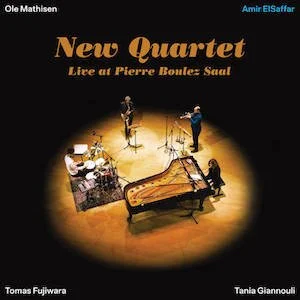Label: Blue Note Records, 2025
Personnel - Julian Lage: electric and acoustic guitar; John Medeski: Hammond B3 organ, piano; Jorge Roeder: double bass; Kenny Wollesen: drums, percussion; Patrick Warren: piano, bells, percussion, dulcitone, strings.
The versatility and inventive spirit of American guitarist and composer Julian Lage have led him to collaborations with transcendental saxophonist Charles Lloyd, iconic vibraphonist Gary Burton, visionary composer and saxophonist John Zorn, and guitarist-improviser Nels Cline, with whom he released an excellent contemporary duo session in 2014. The follow-up to Speak To Me (Blue Note, 2024), Scenes From Above is a nine-track set of originals—written during what Lage calls a “writing spring”—and dedicated to his father, Mario Lage. The album retains Jorge Roeder on bass while adding keyboardist John Medeski and drummer Kenny Wollesen. On six tracks, the core quartet expands into a quintet with pianist Patrick Warren, who also contributes bells, dulcitone, percussion, and strings.
The playing is focused from the outset, and the breezy opener “Opal” arrives charged with emotion, wrapped in an affable country feel. Medeski’s keyboards lend an aureole-like brightness and ethereal lift, while Wollesen’s hi-hat grounding keeps the music tethered to the earth. “Red Elm”, propelled by a beguiling bass pizzicato, builds its appeal on a relaxed swinging drive. While tension and release are present, the quartet favors a serene approach, allowing the elements to converge smoothly. Lage’s phrasing here is warm and fluid, infused with understated blues inflections.
With a dexterous arrangement and compelling transitions, “Talking Drum” draws color from groovy funk and blues, providing a fertile vehicle for Medeski’s keyboard explorations and Lage’s judicious note choices and shifting moods. If this track features Warren on dulcitone, then “Havens” highlights his signature Chamberlin tape-replay keyboard. That piece also incorporates skittering percussion and heavy-groove acoustic guitar strums, enriching its layered texture.
Lage switches to acoustic guitar on the picturesque “Ocala”, which sustains a romantic aura with a gentle calypso touch. All the musicians contribute to an understated dramatic effect, though Wollesen’s graceful cymbal work is especially notable. At times, the music veers toward an overly sweet sensibility, building lovely melodies atop light-footed foundations. In spots, it lacks spark, with a few moments feeling stiff. Still, the playing remains consistently assured, as evidenced by “Night Shade”, a relaxed brushed power ballad that recalls Procol Harum and The Animals before unfolding into a gospel-tinged vamp.
The album closes with “Something More”, another tune that confidently straddles country, pop, and jazz territories through its charisma-laden interplay. Not particularly groundbreaking or deeply memorable, Scenes From Above nonetheless brings the intimate chemistry of Lage’s new group into clear focus.
Favorite Tracks:
03 - Talking Drum ► 04 - Havens ► 05 - Night Shade








































